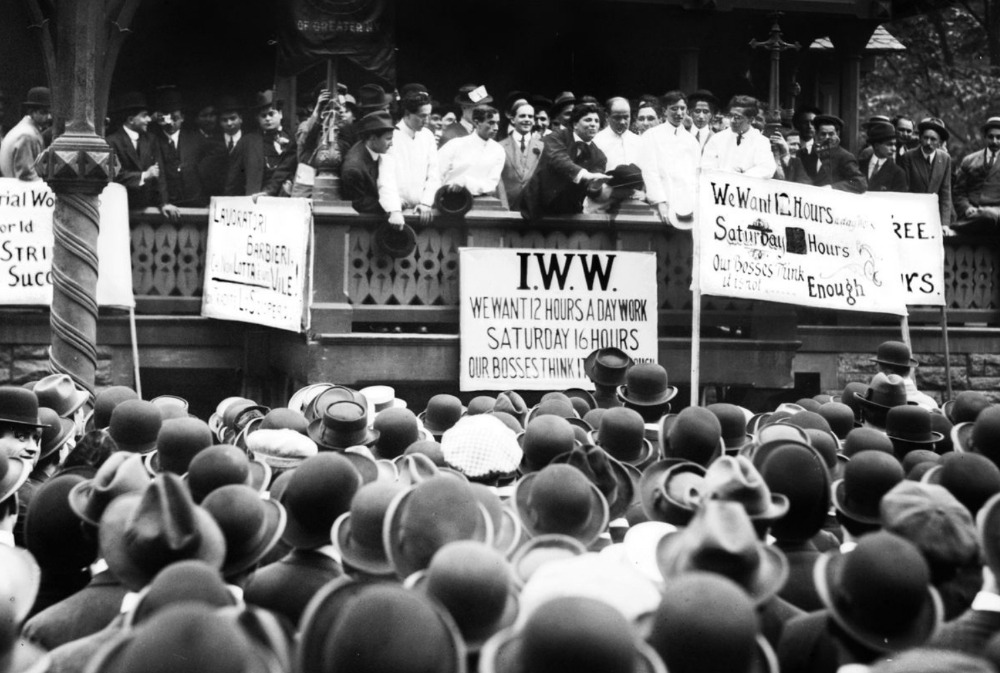The Industrial Workers of the World, known as the IWW or “Wobblies,” in the early 1900s had aggressively recruited mill workers and loggers in Southwest Washington State. The Wobblies believed that a revolution was at hand. Mill owners were understandably alarmed, while the general public was caught in the middle. Violent incidents in Everett and Seattle had preceded the tension in Centralia, and vigilante groups occasionally arose in opposition to the Wobbly presence.
Quiet, conservative Centralia had experienced a run-in with Wobblies in 1918, during the “patriotic” Great War in France. Wobbly opposition to the war had prompted participants in a Red Cross parade to suddenly raid Centralia’s Wobbly Hall. A secret meeting of local citizens formed the Centralia Citizens Protective Association, whose sole purpose was to combat Wobbly “trouble.”
When the November 11, 1919 Armistice Day parade halted in front of Centralia’s Wobbly Hall, two or three uniformed marchers approached the Hall’s door. Shots rang out, several people were hit, pandemonium ensued. Warren Grim, a leader of the marchers, died. Wesley Everest, a Wobbly, was chased by a revengeful mob. Later that night, Everest was hustled out of the Centralia jail, taken to a bridge over the Centralia River, and hanged.
Public hysteria ensued, prompted by the sudden presence of state militia. A lengthy jury trial with Wobbly defendants in the dock, helped focus national attention on the Centralia affair.
The steady hand of George Vanderveer, defense attorney for the Wobblies, turned the nearby Montesano courtroom to resemble a public theater. Vanderveer, as former King County Prosecuting Attorney, had been educated at Columbia and Stanford. He was tough, colorful, and appeared to like the Wobblies. Despite his skilled efforts, 9 of the 11 defendants were found guilty of second-degree murder.
In later years, Defense Committees and other organizations attempted to obtain pardons for the convicted men. The sordid murder of Wesley Everest and the fact that Armistice Day marchers in Centralia had assaulted the Wobbly Hall doors, stirred the pot. Eventually, after time had dimmed memories, Washington State Gov. Clarence D. Martin pardoned the Wobblies. Author John McClelland, in his book Wobbly War, noted that the small town of Centralia had for years avoided comment on its violent past.
The Wobblies experienced a 1930s “revival” in the Yakima Valley, Washington, where deteriorating work conditions and declining agricultural wages caused unrest. The Wobblies organized hop workers and called a strike, causing unease and farmers’ vigilante activity in the Valley and other Western agricultural areas.
Eventually FDR’s New Deal, the Second World War, and a general rise in affluence left the old idealists behind. Some Wobbly issues survived: better wages; an 8-hour day; and restrictions on child labor.
Discover more from Post Alley
Subscribe to get the latest posts sent to your email.

Thank you for this look back at a key moment in Northwest history; it seems very much forgotten today.
The accompanying photos add much to the piece. Imagine striking for a 12-hour work day.
Let’s not forget that the Wobblies’ official ideology was anarchist syndicalism, in which the workers would dispossess property owners — seize their factories without payment and end the market system. They never did it, but it’s what they said their goal was. They did not believe in voting or supporting political candidates because they did not believe in government. They called American Federation of Labor men “scissorbills” for making labor contracts with employers. The Wobblies called themselves a union — the Industrial Workers of the World, which still, in fact, exists — but in their heyday they didn’t make labor contracts because they didn’t want to do business with the owners. They pushed for better food and sanitation in the lumber camps, and did some other good things, but they were hardly liberals or even progressives.
“some other good things” Really? You think they were just pushing for better food? Logging was then, and still is, one of the most dangerous occupations in the U.S., certainly in the Northwest.
The AFL was an active participant in the animosities with the IWW. Insults meaningful to each were cast in both directions. This includes permission to cross each other’s picket lines.
If the AFL had been visibly concerning itself with the needs of impoverished workers and immigrants, the IWW could not have become what it was.